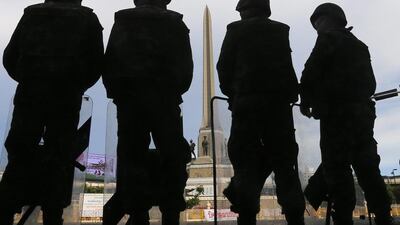BANGKOK // The head of the military junta that took control of Thailand in a coup last week said on Friday that elections may not occur for more than a year because peace and reforms must be achieved first.
Army chief General Prayuth Chan-ocha spelled out the junta’s plans in his first speech directly to the public since the May 22 coup.
Gen Prayuth repeated warnings against protests or resistance to the army’s takeover, saying they would slow the process of bringing back “happiness” to the Thai people.
He said it would take at least two to three months to achieve reconciliation in the deeply divided country, and then it would take about a year to write a new constitution and set up an interim government. Only then could elections be held, he said.
“Give us time to solve the problems for you. Then the soldiers will step back to look at Thailand from afar,” he said.
Gen Prayuth also explained the junta’s plans for administering the country, emphasising financial stability and transparency.
The army on Friday also said it would set up reconciliation centres across the country aimed at healing a decade of political division that has often spilled into violence.
“The model is Prayuth’s and it is intended to build peace because even within the same family politics can’t be discussed,” said Col Banpot Poonpien, a spokesman for the military’s internal security operation command (Isoc).
“We must work on how to teach people to live together harmoniously,” Col Banpot said.
The Isoc is a military national security agency that took on leftists in the 1970s and now has sweeping powers and broad security responsibilities.
Col Banpot said Gen Prayuth had given the Isoc the responsibility of setting up reconciliation centres in all of Thailand’s regions.
While details of where and how they would operate were not finalised, he said the objective was to bring people with differing views together and that political activists would be asked to attend.
However, in the past week the junta has moved to silence its critics and warned that it would not tolerate dissent.
It has summoned more than 250 people, including members of the government it ousted and other leading political figures, journalists, scholars and activists seen as critical of the regime. Roughly 70 people are still in custody.
Among those summoned was veteran social activist Sombat Boonngam-anong, who is allied with “red shirts”, who backed the ousted government and has played a role in organising anti-coup protests.
Mr Sombat has gone into hiding but taunted the military by posting the call to protest on his Facebook page, summoning 10,000 people to come in disguise for a “mask party to celebrate the coup”. Protesters have started wearing masks with the faces of political personalities, including the army chief, Prayuth.
“There is no need to be aggressive in opposing the coup. Smile, please, and take it easy,” Mr Sombat said. “The masks you wear ... will be enough to make the dictators in the military lose face.”
“The goal is to tell the world what we think about the coup,” he said, setting the meeting place at a McDonald’s restaurant in central Bangkok.
Anticipating that soldiers might seal the area, he urged protesters to “go play” elsewhere and listed different neighbourhoods in the capital where they could regroup.
The army coup overthrew a government that won a landslide election victory three years ago.
At the centre of Thailand’s deep political divide is Thaksin Shinawatra, a billionaire former prime minister supported by many rural Thais for his populist programmes but despised by others – particularly Bangkok’s elite and middle classes – over allegations of corruption, abuse of power and disrespect for the monarchy. He was ousted in a 2006 coup and lives abroad in self-imposed exile, but held great influence over the overthrown government, which had been led by his sister until a court ousted her earlier this month.
* Associated Press and Reuters

